MGMT 4 (Semester 1, 2019): Ethics, CSR, and Organizational Values
VerifiedAdded on 2022/11/24
|9
|2389
|266
Report
AI Summary
This report delves into the crucial aspects of organizational values, regulations, and ethics within contemporary business contexts. It examines the significance of business ethics in fostering effective operations and highlights the benefits of ethical conduct for both organizations and their stakeholders. The report analyzes organizational values that support ethical decision-making, emphasizing their role in enhancing efficiency and profitability. It further assesses ethical dilemmas faced by modern organizations and their impact on performance. The analysis extends to the implications of social and public pressure on ethical behavior, as well as the role of internal values in promoting corporate social responsibility (CSR) and stakeholder engagement. The report underscores the importance of ethical leadership, compliance with laws and regulations, and the proactive management of ethical challenges to ensure long-term organizational sustainability and success.
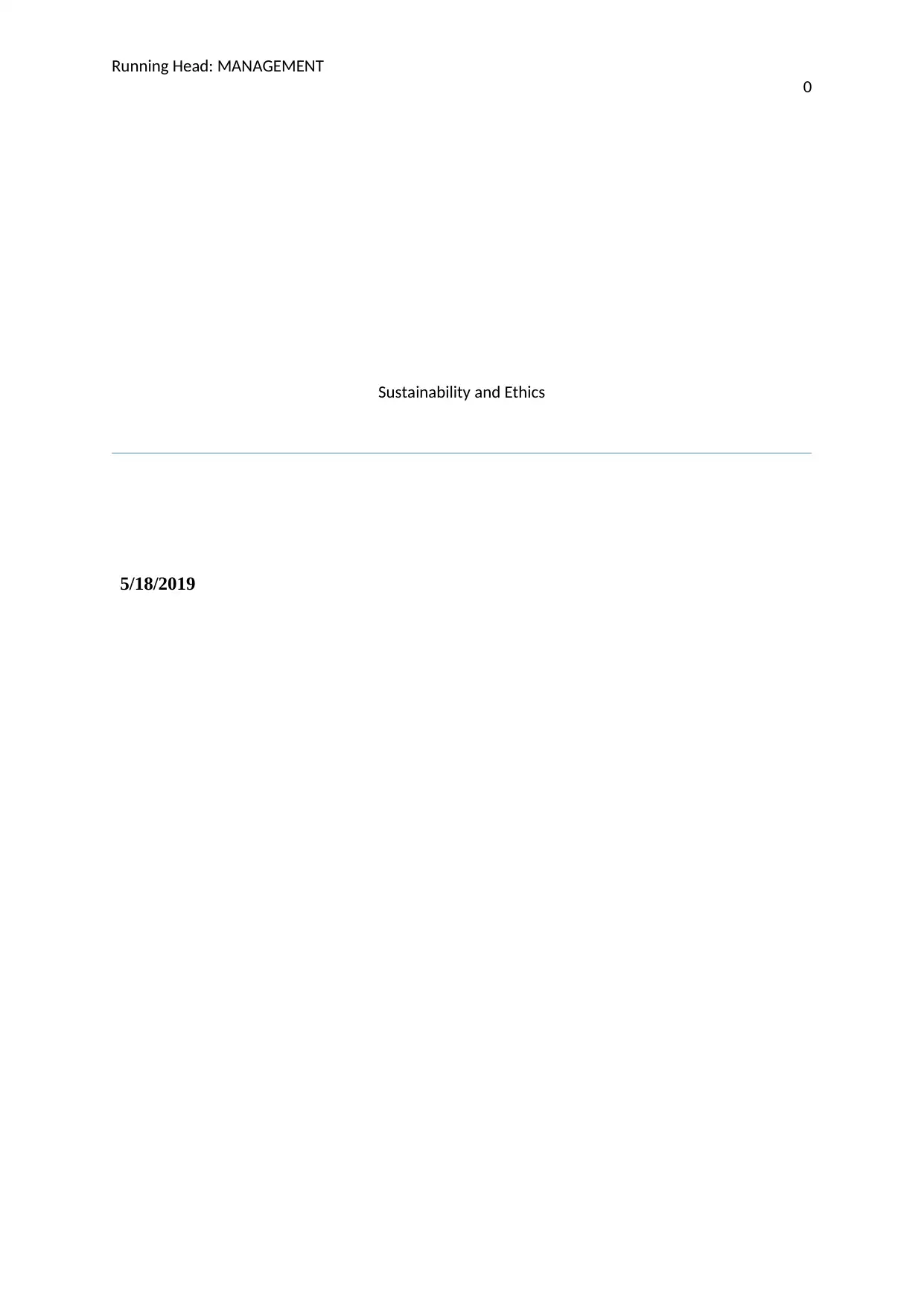
Running Head: MANAGEMENT
0
Sustainability and Ethics
5/18/2019
0
Sustainability and Ethics
5/18/2019
Paraphrase This Document
Need a fresh take? Get an instant paraphrase of this document with our AI Paraphraser
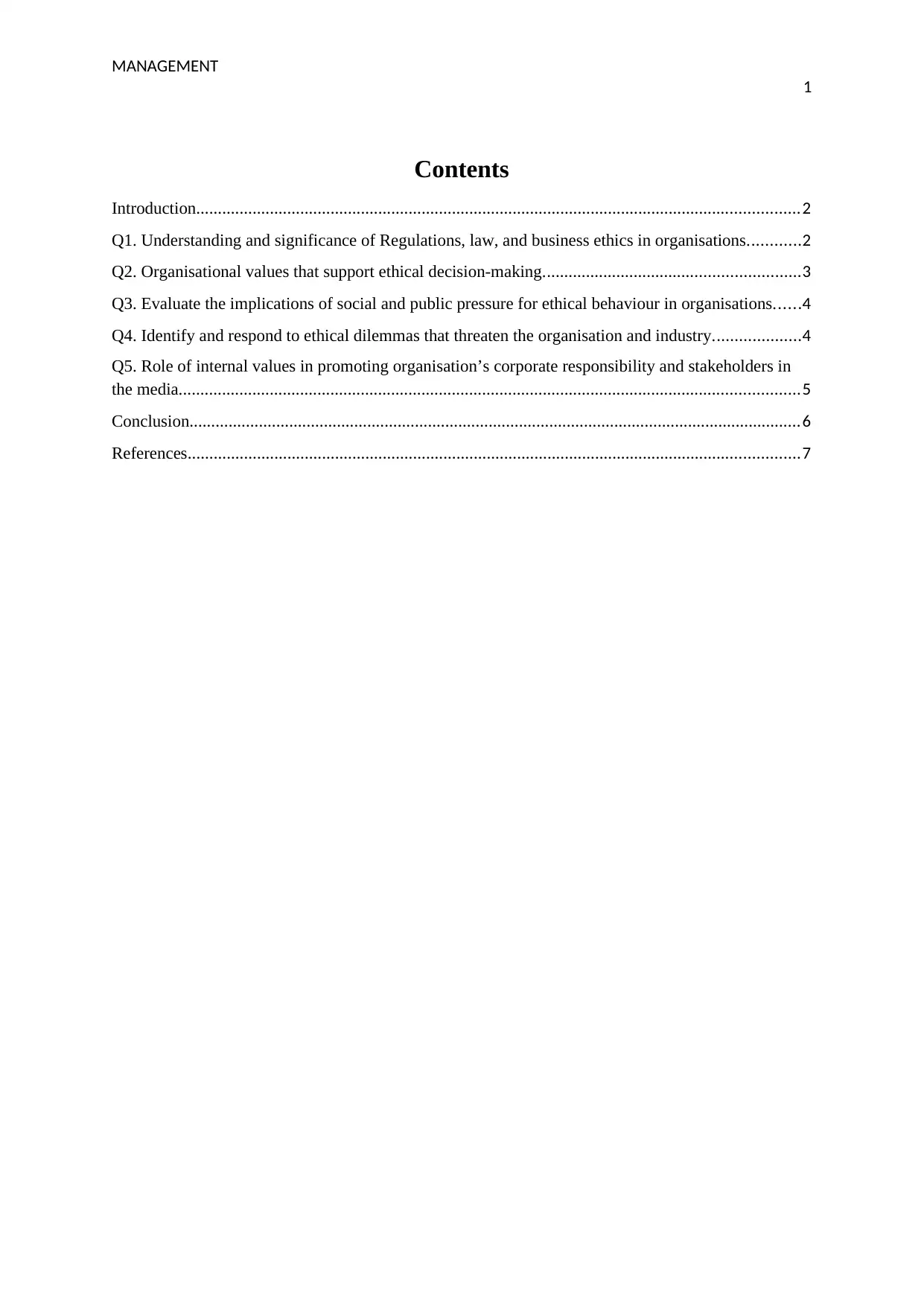
MANAGEMENT
1
Contents
Introduction...........................................................................................................................................2
Q1. Understanding and significance of Regulations, law, and business ethics in organisations............2
Q2. Organisational values that support ethical decision-making...........................................................3
Q3. Evaluate the implications of social and public pressure for ethical behaviour in organisations......4
Q4. Identify and respond to ethical dilemmas that threaten the organisation and industry....................4
Q5. Role of internal values in promoting organisation’s corporate responsibility and stakeholders in
the media...............................................................................................................................................5
Conclusion.............................................................................................................................................6
References.............................................................................................................................................7
1
Contents
Introduction...........................................................................................................................................2
Q1. Understanding and significance of Regulations, law, and business ethics in organisations............2
Q2. Organisational values that support ethical decision-making...........................................................3
Q3. Evaluate the implications of social and public pressure for ethical behaviour in organisations......4
Q4. Identify and respond to ethical dilemmas that threaten the organisation and industry....................4
Q5. Role of internal values in promoting organisation’s corporate responsibility and stakeholders in
the media...............................................................................................................................................5
Conclusion.............................................................................................................................................6
References.............................................................................................................................................7
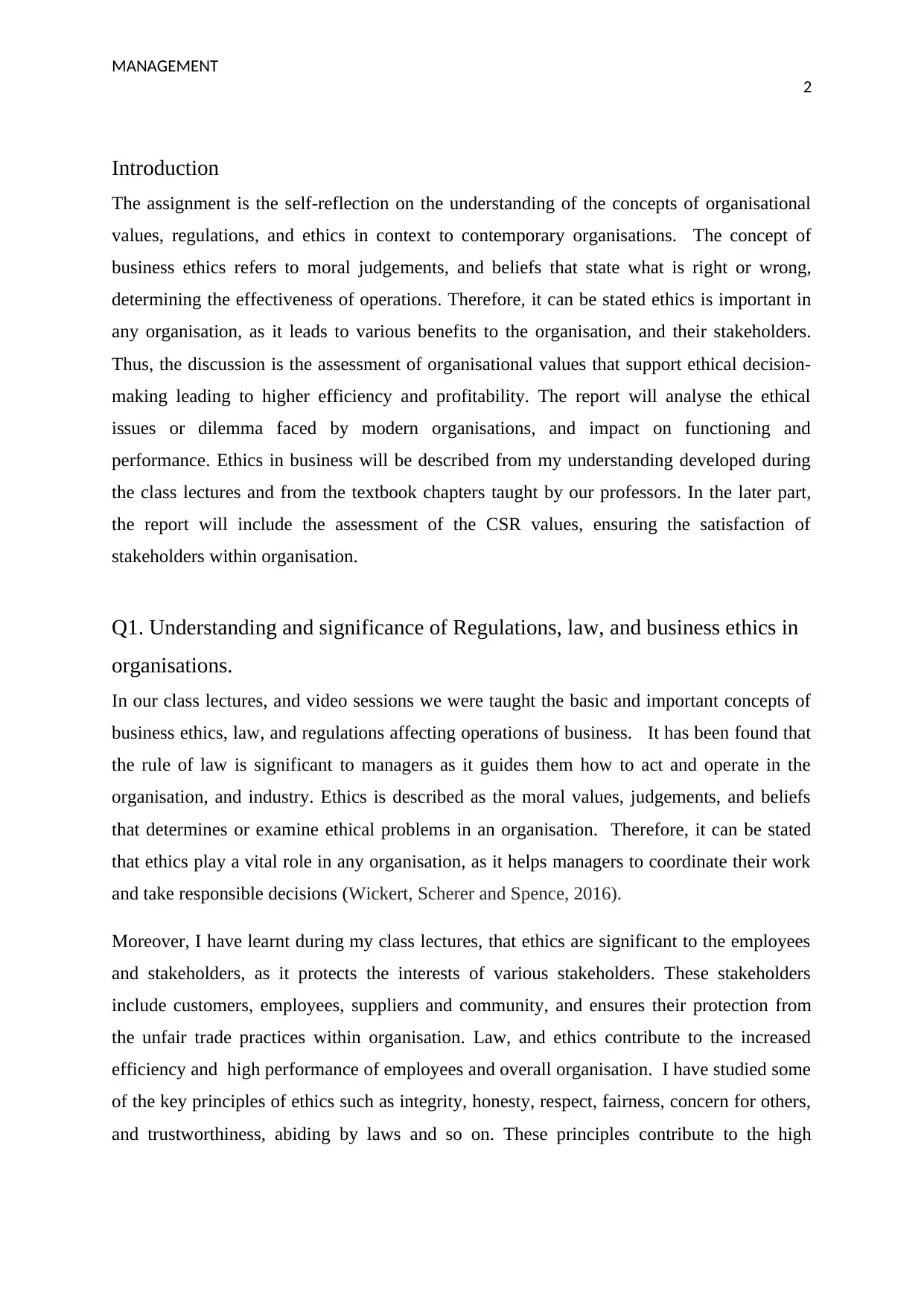
MANAGEMENT
2
Introduction
The assignment is the self-reflection on the understanding of the concepts of organisational
values, regulations, and ethics in context to contemporary organisations. The concept of
business ethics refers to moral judgements, and beliefs that state what is right or wrong,
determining the effectiveness of operations. Therefore, it can be stated ethics is important in
any organisation, as it leads to various benefits to the organisation, and their stakeholders.
Thus, the discussion is the assessment of organisational values that support ethical decision-
making leading to higher efficiency and profitability. The report will analyse the ethical
issues or dilemma faced by modern organisations, and impact on functioning and
performance. Ethics in business will be described from my understanding developed during
the class lectures and from the textbook chapters taught by our professors. In the later part,
the report will include the assessment of the CSR values, ensuring the satisfaction of
stakeholders within organisation.
Q1. Understanding and significance of Regulations, law, and business ethics in
organisations.
In our class lectures, and video sessions we were taught the basic and important concepts of
business ethics, law, and regulations affecting operations of business. It has been found that
the rule of law is significant to managers as it guides them how to act and operate in the
organisation, and industry. Ethics is described as the moral values, judgements, and beliefs
that determines or examine ethical problems in an organisation. Therefore, it can be stated
that ethics play a vital role in any organisation, as it helps managers to coordinate their work
and take responsible decisions (Wickert, Scherer and Spence, 2016).
Moreover, I have learnt during my class lectures, that ethics are significant to the employees
and stakeholders, as it protects the interests of various stakeholders. These stakeholders
include customers, employees, suppliers and community, and ensures their protection from
the unfair trade practices within organisation. Law, and ethics contribute to the increased
efficiency and high performance of employees and overall organisation. I have studied some
of the key principles of ethics such as integrity, honesty, respect, fairness, concern for others,
and trustworthiness, abiding by laws and so on. These principles contribute to the high
2
Introduction
The assignment is the self-reflection on the understanding of the concepts of organisational
values, regulations, and ethics in context to contemporary organisations. The concept of
business ethics refers to moral judgements, and beliefs that state what is right or wrong,
determining the effectiveness of operations. Therefore, it can be stated ethics is important in
any organisation, as it leads to various benefits to the organisation, and their stakeholders.
Thus, the discussion is the assessment of organisational values that support ethical decision-
making leading to higher efficiency and profitability. The report will analyse the ethical
issues or dilemma faced by modern organisations, and impact on functioning and
performance. Ethics in business will be described from my understanding developed during
the class lectures and from the textbook chapters taught by our professors. In the later part,
the report will include the assessment of the CSR values, ensuring the satisfaction of
stakeholders within organisation.
Q1. Understanding and significance of Regulations, law, and business ethics in
organisations.
In our class lectures, and video sessions we were taught the basic and important concepts of
business ethics, law, and regulations affecting operations of business. It has been found that
the rule of law is significant to managers as it guides them how to act and operate in the
organisation, and industry. Ethics is described as the moral values, judgements, and beliefs
that determines or examine ethical problems in an organisation. Therefore, it can be stated
that ethics play a vital role in any organisation, as it helps managers to coordinate their work
and take responsible decisions (Wickert, Scherer and Spence, 2016).
Moreover, I have learnt during my class lectures, that ethics are significant to the employees
and stakeholders, as it protects the interests of various stakeholders. These stakeholders
include customers, employees, suppliers and community, and ensures their protection from
the unfair trade practices within organisation. Law, and ethics contribute to the increased
efficiency and high performance of employees and overall organisation. I have studied some
of the key principles of ethics such as integrity, honesty, respect, fairness, concern for others,
and trustworthiness, abiding by laws and so on. These principles contribute to the high
⊘ This is a preview!⊘
Do you want full access?
Subscribe today to unlock all pages.

Trusted by 1+ million students worldwide
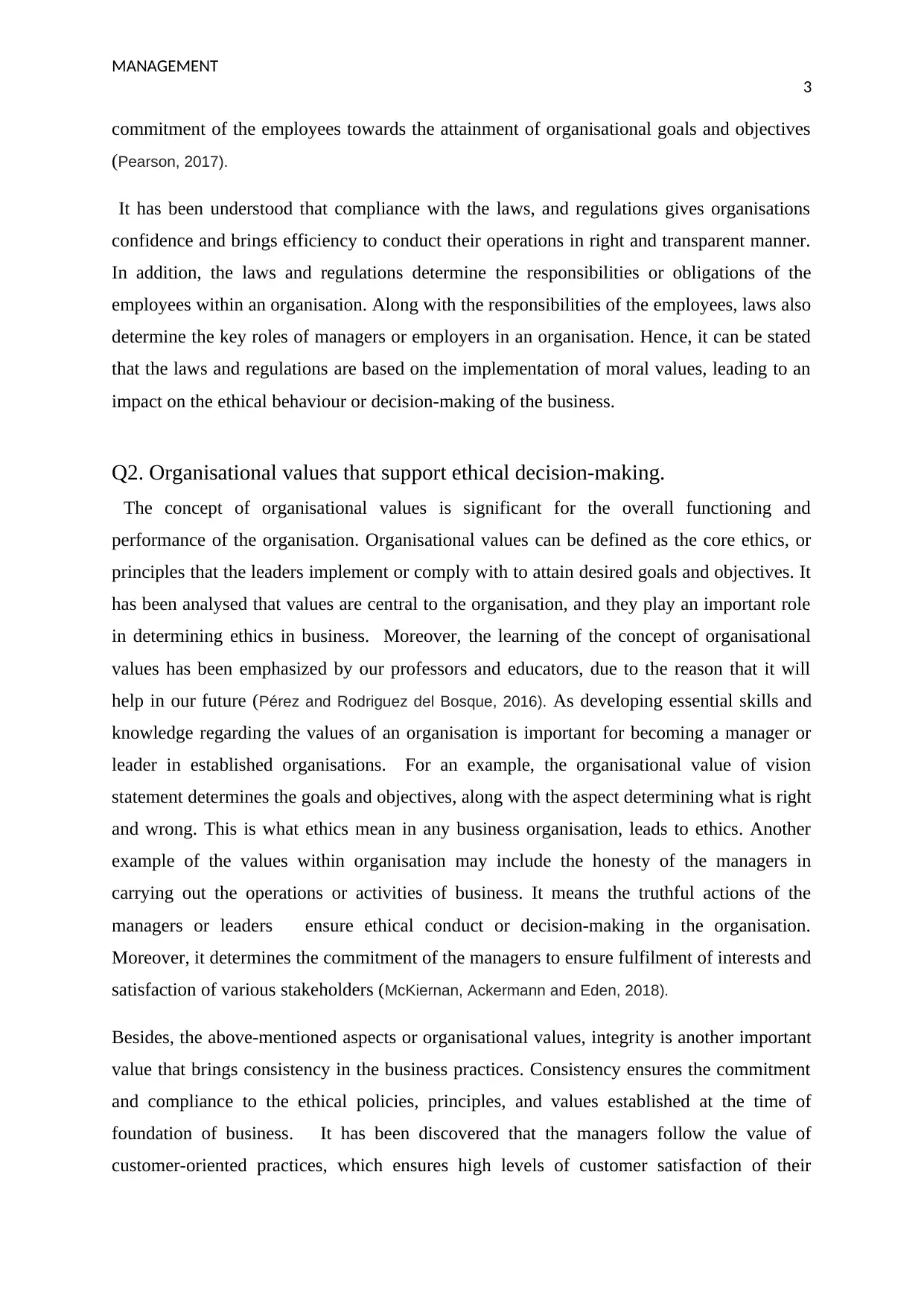
MANAGEMENT
3
commitment of the employees towards the attainment of organisational goals and objectives
(Pearson, 2017).
It has been understood that compliance with the laws, and regulations gives organisations
confidence and brings efficiency to conduct their operations in right and transparent manner.
In addition, the laws and regulations determine the responsibilities or obligations of the
employees within an organisation. Along with the responsibilities of the employees, laws also
determine the key roles of managers or employers in an organisation. Hence, it can be stated
that the laws and regulations are based on the implementation of moral values, leading to an
impact on the ethical behaviour or decision-making of the business.
Q2. Organisational values that support ethical decision-making.
The concept of organisational values is significant for the overall functioning and
performance of the organisation. Organisational values can be defined as the core ethics, or
principles that the leaders implement or comply with to attain desired goals and objectives. It
has been analysed that values are central to the organisation, and they play an important role
in determining ethics in business. Moreover, the learning of the concept of organisational
values has been emphasized by our professors and educators, due to the reason that it will
help in our future (Pérez and Rodriguez del Bosque, 2016). As developing essential skills and
knowledge regarding the values of an organisation is important for becoming a manager or
leader in established organisations. For an example, the organisational value of vision
statement determines the goals and objectives, along with the aspect determining what is right
and wrong. This is what ethics mean in any business organisation, leads to ethics. Another
example of the values within organisation may include the honesty of the managers in
carrying out the operations or activities of business. It means the truthful actions of the
managers or leaders ensure ethical conduct or decision-making in the organisation.
Moreover, it determines the commitment of the managers to ensure fulfilment of interests and
satisfaction of various stakeholders (McKiernan, Ackermann and Eden, 2018).
Besides, the above-mentioned aspects or organisational values, integrity is another important
value that brings consistency in the business practices. Consistency ensures the commitment
and compliance to the ethical policies, principles, and values established at the time of
foundation of business. It has been discovered that the managers follow the value of
customer-oriented practices, which ensures high levels of customer satisfaction of their
3
commitment of the employees towards the attainment of organisational goals and objectives
(Pearson, 2017).
It has been understood that compliance with the laws, and regulations gives organisations
confidence and brings efficiency to conduct their operations in right and transparent manner.
In addition, the laws and regulations determine the responsibilities or obligations of the
employees within an organisation. Along with the responsibilities of the employees, laws also
determine the key roles of managers or employers in an organisation. Hence, it can be stated
that the laws and regulations are based on the implementation of moral values, leading to an
impact on the ethical behaviour or decision-making of the business.
Q2. Organisational values that support ethical decision-making.
The concept of organisational values is significant for the overall functioning and
performance of the organisation. Organisational values can be defined as the core ethics, or
principles that the leaders implement or comply with to attain desired goals and objectives. It
has been analysed that values are central to the organisation, and they play an important role
in determining ethics in business. Moreover, the learning of the concept of organisational
values has been emphasized by our professors and educators, due to the reason that it will
help in our future (Pérez and Rodriguez del Bosque, 2016). As developing essential skills and
knowledge regarding the values of an organisation is important for becoming a manager or
leader in established organisations. For an example, the organisational value of vision
statement determines the goals and objectives, along with the aspect determining what is right
and wrong. This is what ethics mean in any business organisation, leads to ethics. Another
example of the values within organisation may include the honesty of the managers in
carrying out the operations or activities of business. It means the truthful actions of the
managers or leaders ensure ethical conduct or decision-making in the organisation.
Moreover, it determines the commitment of the managers to ensure fulfilment of interests and
satisfaction of various stakeholders (McKiernan, Ackermann and Eden, 2018).
Besides, the above-mentioned aspects or organisational values, integrity is another important
value that brings consistency in the business practices. Consistency ensures the commitment
and compliance to the ethical policies, principles, and values established at the time of
foundation of business. It has been discovered that the managers follow the value of
customer-oriented practices, which ensures high levels of customer satisfaction of their
Paraphrase This Document
Need a fresh take? Get an instant paraphrase of this document with our AI Paraphraser
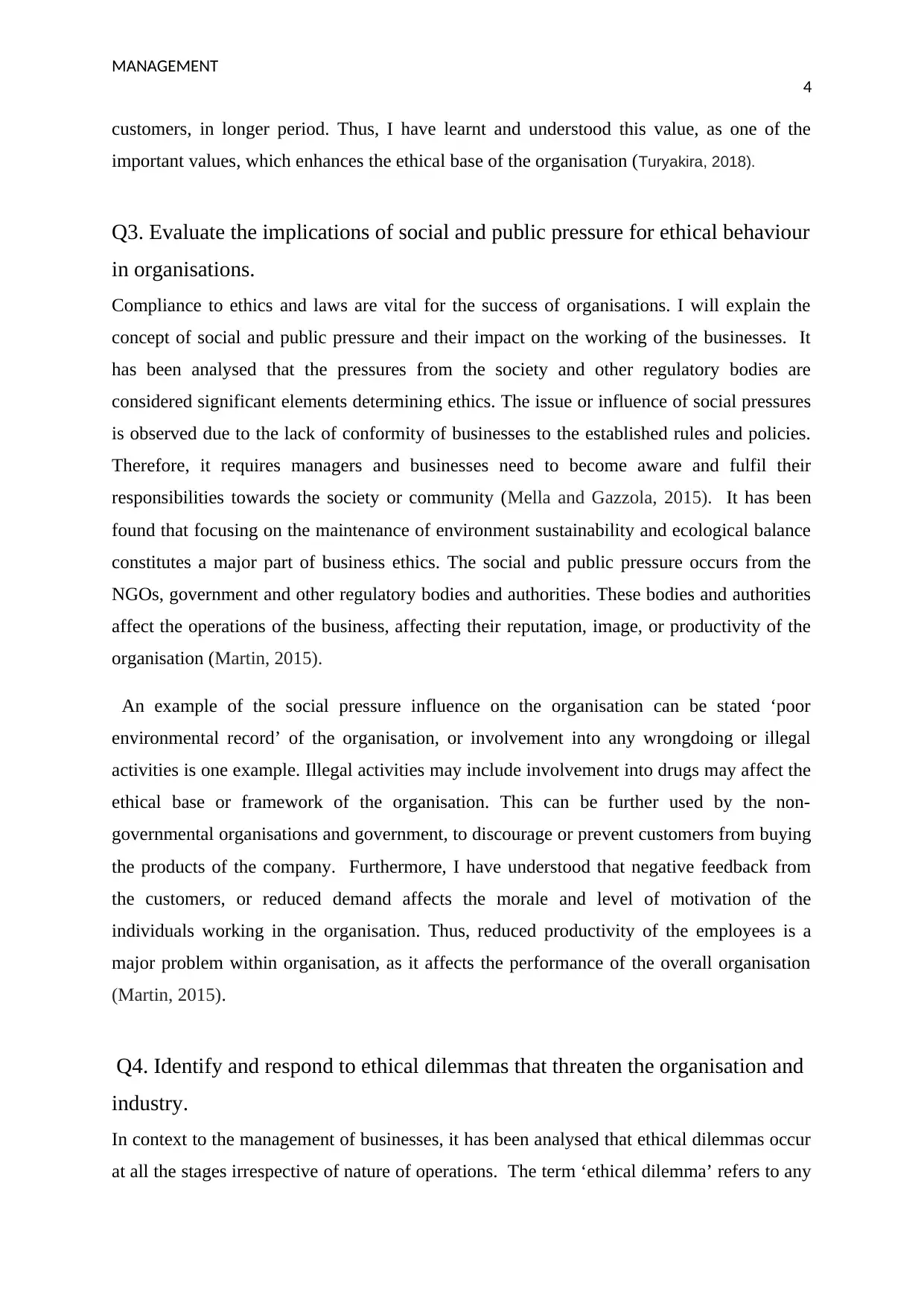
MANAGEMENT
4
customers, in longer period. Thus, I have learnt and understood this value, as one of the
important values, which enhances the ethical base of the organisation (Turyakira, 2018).
Q3. Evaluate the implications of social and public pressure for ethical behaviour
in organisations.
Compliance to ethics and laws are vital for the success of organisations. I will explain the
concept of social and public pressure and their impact on the working of the businesses. It
has been analysed that the pressures from the society and other regulatory bodies are
considered significant elements determining ethics. The issue or influence of social pressures
is observed due to the lack of conformity of businesses to the established rules and policies.
Therefore, it requires managers and businesses need to become aware and fulfil their
responsibilities towards the society or community (Mella and Gazzola, 2015). It has been
found that focusing on the maintenance of environment sustainability and ecological balance
constitutes a major part of business ethics. The social and public pressure occurs from the
NGOs, government and other regulatory bodies and authorities. These bodies and authorities
affect the operations of the business, affecting their reputation, image, or productivity of the
organisation (Martin, 2015).
An example of the social pressure influence on the organisation can be stated ‘poor
environmental record’ of the organisation, or involvement into any wrongdoing or illegal
activities is one example. Illegal activities may include involvement into drugs may affect the
ethical base or framework of the organisation. This can be further used by the non-
governmental organisations and government, to discourage or prevent customers from buying
the products of the company. Furthermore, I have understood that negative feedback from
the customers, or reduced demand affects the morale and level of motivation of the
individuals working in the organisation. Thus, reduced productivity of the employees is a
major problem within organisation, as it affects the performance of the overall organisation
(Martin, 2015).
Q4. Identify and respond to ethical dilemmas that threaten the organisation and
industry.
In context to the management of businesses, it has been analysed that ethical dilemmas occur
at all the stages irrespective of nature of operations. The term ‘ethical dilemma’ refers to any
4
customers, in longer period. Thus, I have learnt and understood this value, as one of the
important values, which enhances the ethical base of the organisation (Turyakira, 2018).
Q3. Evaluate the implications of social and public pressure for ethical behaviour
in organisations.
Compliance to ethics and laws are vital for the success of organisations. I will explain the
concept of social and public pressure and their impact on the working of the businesses. It
has been analysed that the pressures from the society and other regulatory bodies are
considered significant elements determining ethics. The issue or influence of social pressures
is observed due to the lack of conformity of businesses to the established rules and policies.
Therefore, it requires managers and businesses need to become aware and fulfil their
responsibilities towards the society or community (Mella and Gazzola, 2015). It has been
found that focusing on the maintenance of environment sustainability and ecological balance
constitutes a major part of business ethics. The social and public pressure occurs from the
NGOs, government and other regulatory bodies and authorities. These bodies and authorities
affect the operations of the business, affecting their reputation, image, or productivity of the
organisation (Martin, 2015).
An example of the social pressure influence on the organisation can be stated ‘poor
environmental record’ of the organisation, or involvement into any wrongdoing or illegal
activities is one example. Illegal activities may include involvement into drugs may affect the
ethical base or framework of the organisation. This can be further used by the non-
governmental organisations and government, to discourage or prevent customers from buying
the products of the company. Furthermore, I have understood that negative feedback from
the customers, or reduced demand affects the morale and level of motivation of the
individuals working in the organisation. Thus, reduced productivity of the employees is a
major problem within organisation, as it affects the performance of the overall organisation
(Martin, 2015).
Q4. Identify and respond to ethical dilemmas that threaten the organisation and
industry.
In context to the management of businesses, it has been analysed that ethical dilemmas occur
at all the stages irrespective of nature of operations. The term ‘ethical dilemma’ refers to any
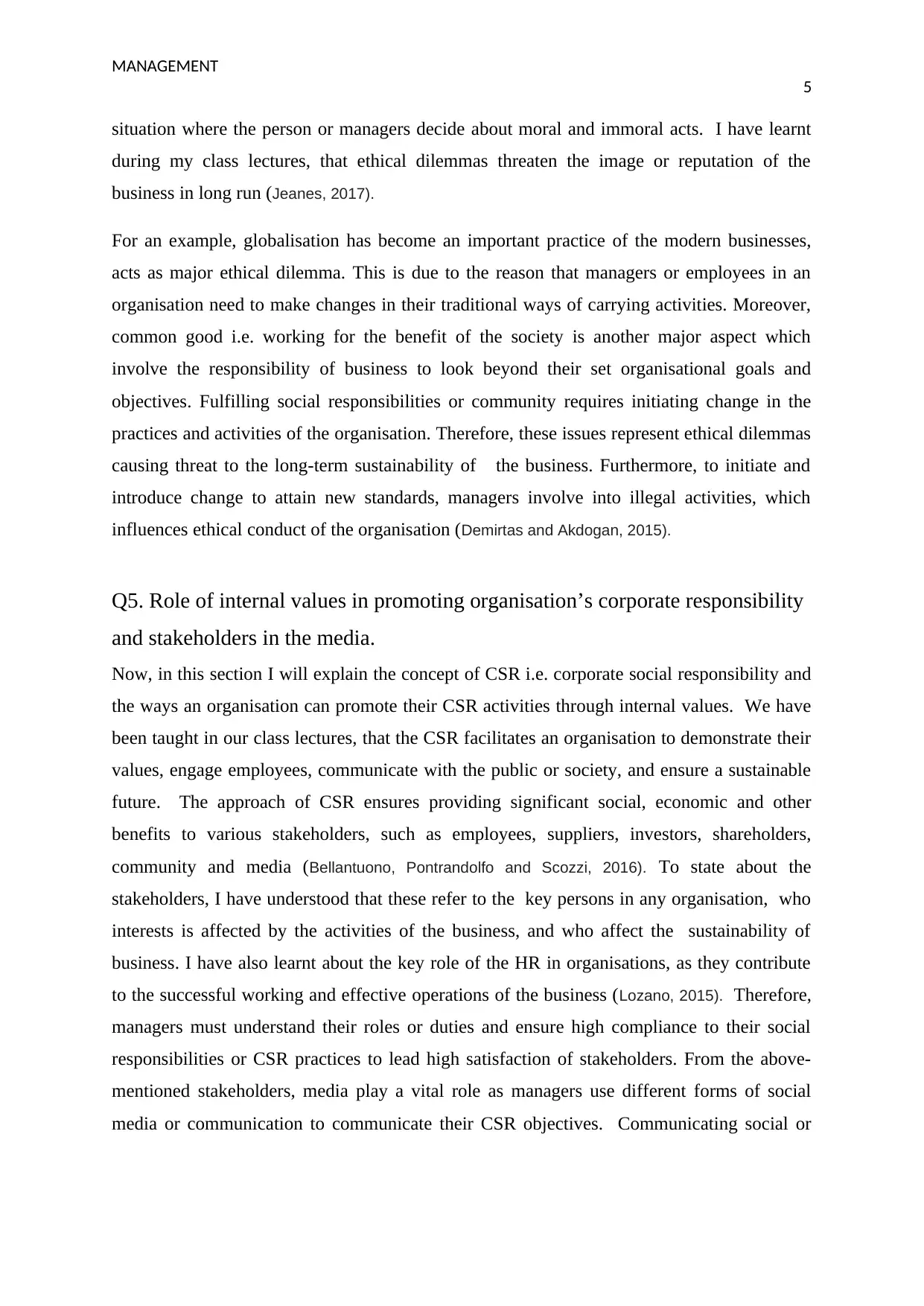
MANAGEMENT
5
situation where the person or managers decide about moral and immoral acts. I have learnt
during my class lectures, that ethical dilemmas threaten the image or reputation of the
business in long run (Jeanes, 2017).
For an example, globalisation has become an important practice of the modern businesses,
acts as major ethical dilemma. This is due to the reason that managers or employees in an
organisation need to make changes in their traditional ways of carrying activities. Moreover,
common good i.e. working for the benefit of the society is another major aspect which
involve the responsibility of business to look beyond their set organisational goals and
objectives. Fulfilling social responsibilities or community requires initiating change in the
practices and activities of the organisation. Therefore, these issues represent ethical dilemmas
causing threat to the long-term sustainability of the business. Furthermore, to initiate and
introduce change to attain new standards, managers involve into illegal activities, which
influences ethical conduct of the organisation (Demirtas and Akdogan, 2015).
Q5. Role of internal values in promoting organisation’s corporate responsibility
and stakeholders in the media.
Now, in this section I will explain the concept of CSR i.e. corporate social responsibility and
the ways an organisation can promote their CSR activities through internal values. We have
been taught in our class lectures, that the CSR facilitates an organisation to demonstrate their
values, engage employees, communicate with the public or society, and ensure a sustainable
future. The approach of CSR ensures providing significant social, economic and other
benefits to various stakeholders, such as employees, suppliers, investors, shareholders,
community and media (Bellantuono, Pontrandolfo and Scozzi, 2016). To state about the
stakeholders, I have understood that these refer to the key persons in any organisation, who
interests is affected by the activities of the business, and who affect the sustainability of
business. I have also learnt about the key role of the HR in organisations, as they contribute
to the successful working and effective operations of the business (Lozano, 2015). Therefore,
managers must understand their roles or duties and ensure high compliance to their social
responsibilities or CSR practices to lead high satisfaction of stakeholders. From the above-
mentioned stakeholders, media play a vital role as managers use different forms of social
media or communication to communicate their CSR objectives. Communicating social or
5
situation where the person or managers decide about moral and immoral acts. I have learnt
during my class lectures, that ethical dilemmas threaten the image or reputation of the
business in long run (Jeanes, 2017).
For an example, globalisation has become an important practice of the modern businesses,
acts as major ethical dilemma. This is due to the reason that managers or employees in an
organisation need to make changes in their traditional ways of carrying activities. Moreover,
common good i.e. working for the benefit of the society is another major aspect which
involve the responsibility of business to look beyond their set organisational goals and
objectives. Fulfilling social responsibilities or community requires initiating change in the
practices and activities of the organisation. Therefore, these issues represent ethical dilemmas
causing threat to the long-term sustainability of the business. Furthermore, to initiate and
introduce change to attain new standards, managers involve into illegal activities, which
influences ethical conduct of the organisation (Demirtas and Akdogan, 2015).
Q5. Role of internal values in promoting organisation’s corporate responsibility
and stakeholders in the media.
Now, in this section I will explain the concept of CSR i.e. corporate social responsibility and
the ways an organisation can promote their CSR activities through internal values. We have
been taught in our class lectures, that the CSR facilitates an organisation to demonstrate their
values, engage employees, communicate with the public or society, and ensure a sustainable
future. The approach of CSR ensures providing significant social, economic and other
benefits to various stakeholders, such as employees, suppliers, investors, shareholders,
community and media (Bellantuono, Pontrandolfo and Scozzi, 2016). To state about the
stakeholders, I have understood that these refer to the key persons in any organisation, who
interests is affected by the activities of the business, and who affect the sustainability of
business. I have also learnt about the key role of the HR in organisations, as they contribute
to the successful working and effective operations of the business (Lozano, 2015). Therefore,
managers must understand their roles or duties and ensure high compliance to their social
responsibilities or CSR practices to lead high satisfaction of stakeholders. From the above-
mentioned stakeholders, media play a vital role as managers use different forms of social
media or communication to communicate their CSR objectives. Communicating social or
⊘ This is a preview!⊘
Do you want full access?
Subscribe today to unlock all pages.

Trusted by 1+ million students worldwide
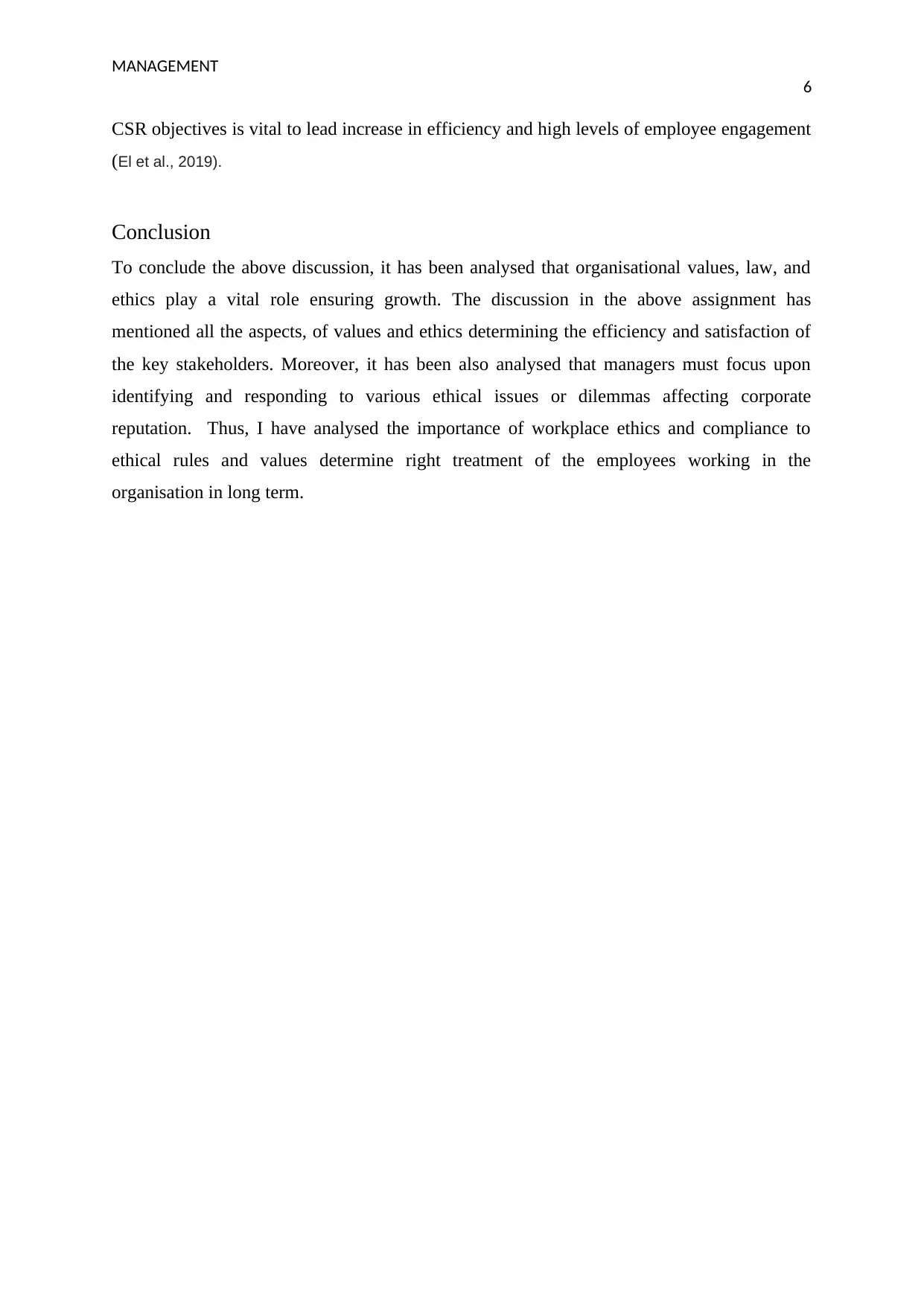
MANAGEMENT
6
CSR objectives is vital to lead increase in efficiency and high levels of employee engagement
(El et al., 2019).
Conclusion
To conclude the above discussion, it has been analysed that organisational values, law, and
ethics play a vital role ensuring growth. The discussion in the above assignment has
mentioned all the aspects, of values and ethics determining the efficiency and satisfaction of
the key stakeholders. Moreover, it has been also analysed that managers must focus upon
identifying and responding to various ethical issues or dilemmas affecting corporate
reputation. Thus, I have analysed the importance of workplace ethics and compliance to
ethical rules and values determine right treatment of the employees working in the
organisation in long term.
6
CSR objectives is vital to lead increase in efficiency and high levels of employee engagement
(El et al., 2019).
Conclusion
To conclude the above discussion, it has been analysed that organisational values, law, and
ethics play a vital role ensuring growth. The discussion in the above assignment has
mentioned all the aspects, of values and ethics determining the efficiency and satisfaction of
the key stakeholders. Moreover, it has been also analysed that managers must focus upon
identifying and responding to various ethical issues or dilemmas affecting corporate
reputation. Thus, I have analysed the importance of workplace ethics and compliance to
ethical rules and values determine right treatment of the employees working in the
organisation in long term.
Paraphrase This Document
Need a fresh take? Get an instant paraphrase of this document with our AI Paraphraser
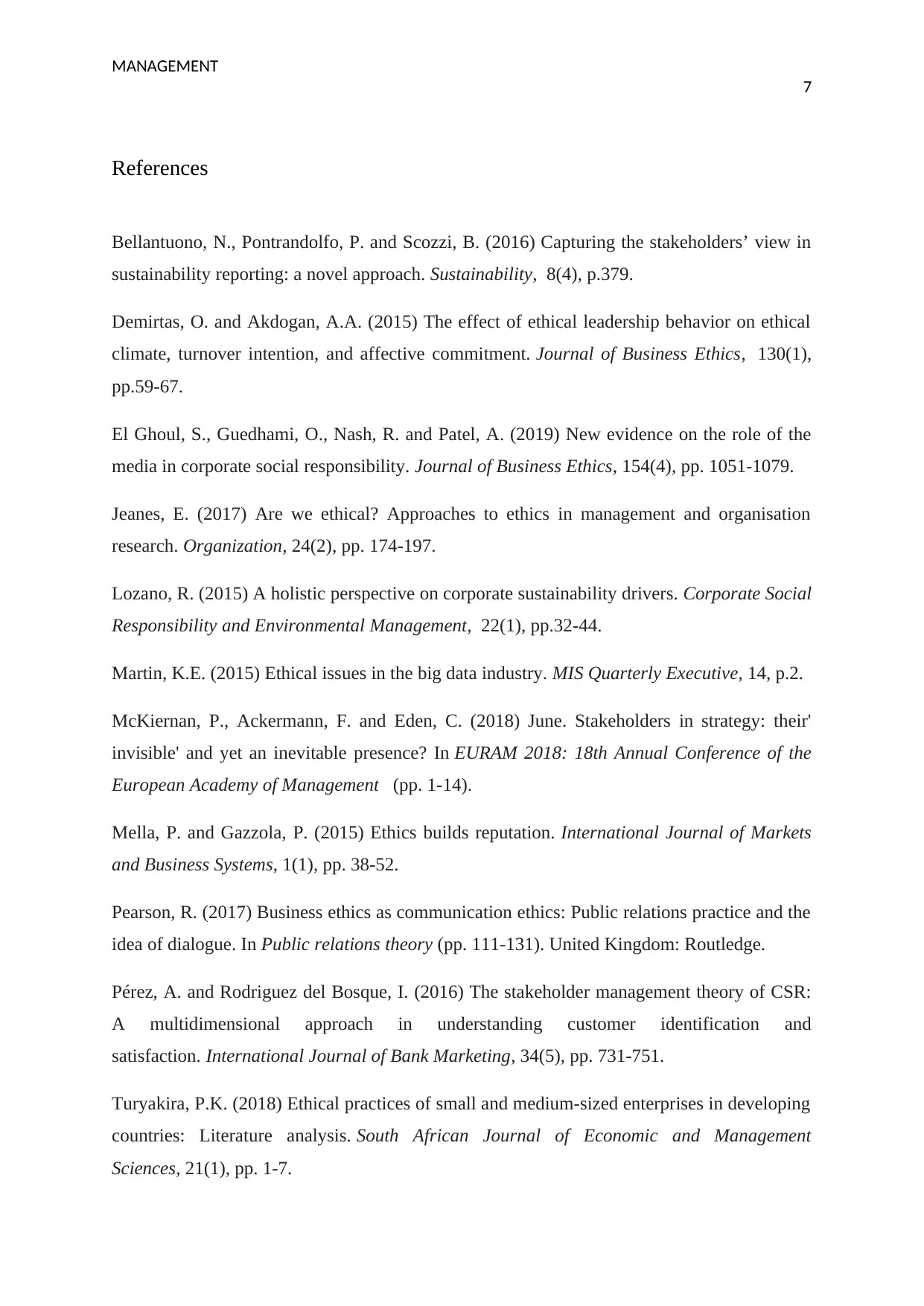
MANAGEMENT
7
References
Bellantuono, N., Pontrandolfo, P. and Scozzi, B. (2016) Capturing the stakeholders’ view in
sustainability reporting: a novel approach. Sustainability, 8(4), p.379.
Demirtas, O. and Akdogan, A.A. (2015) The effect of ethical leadership behavior on ethical
climate, turnover intention, and affective commitment. Journal of Business Ethics, 130(1),
pp.59-67.
El Ghoul, S., Guedhami, O., Nash, R. and Patel, A. (2019) New evidence on the role of the
media in corporate social responsibility. Journal of Business Ethics, 154(4), pp. 1051-1079.
Jeanes, E. (2017) Are we ethical? Approaches to ethics in management and organisation
research. Organization, 24(2), pp. 174-197.
Lozano, R. (2015) A holistic perspective on corporate sustainability drivers. Corporate Social
Responsibility and Environmental Management, 22(1), pp.32-44.
Martin, K.E. (2015) Ethical issues in the big data industry. MIS Quarterly Executive, 14, p.2.
McKiernan, P., Ackermann, F. and Eden, C. (2018) June. Stakeholders in strategy: their'
invisible' and yet an inevitable presence? In EURAM 2018: 18th Annual Conference of the
European Academy of Management (pp. 1-14).
Mella, P. and Gazzola, P. (2015) Ethics builds reputation. International Journal of Markets
and Business Systems, 1(1), pp. 38-52.
Pearson, R. (2017) Business ethics as communication ethics: Public relations practice and the
idea of dialogue. In Public relations theory (pp. 111-131). United Kingdom: Routledge.
Pérez, A. and Rodriguez del Bosque, I. (2016) The stakeholder management theory of CSR:
A multidimensional approach in understanding customer identification and
satisfaction. International Journal of Bank Marketing, 34(5), pp. 731-751.
Turyakira, P.K. (2018) Ethical practices of small and medium-sized enterprises in developing
countries: Literature analysis. South African Journal of Economic and Management
Sciences, 21(1), pp. 1-7.
7
References
Bellantuono, N., Pontrandolfo, P. and Scozzi, B. (2016) Capturing the stakeholders’ view in
sustainability reporting: a novel approach. Sustainability, 8(4), p.379.
Demirtas, O. and Akdogan, A.A. (2015) The effect of ethical leadership behavior on ethical
climate, turnover intention, and affective commitment. Journal of Business Ethics, 130(1),
pp.59-67.
El Ghoul, S., Guedhami, O., Nash, R. and Patel, A. (2019) New evidence on the role of the
media in corporate social responsibility. Journal of Business Ethics, 154(4), pp. 1051-1079.
Jeanes, E. (2017) Are we ethical? Approaches to ethics in management and organisation
research. Organization, 24(2), pp. 174-197.
Lozano, R. (2015) A holistic perspective on corporate sustainability drivers. Corporate Social
Responsibility and Environmental Management, 22(1), pp.32-44.
Martin, K.E. (2015) Ethical issues in the big data industry. MIS Quarterly Executive, 14, p.2.
McKiernan, P., Ackermann, F. and Eden, C. (2018) June. Stakeholders in strategy: their'
invisible' and yet an inevitable presence? In EURAM 2018: 18th Annual Conference of the
European Academy of Management (pp. 1-14).
Mella, P. and Gazzola, P. (2015) Ethics builds reputation. International Journal of Markets
and Business Systems, 1(1), pp. 38-52.
Pearson, R. (2017) Business ethics as communication ethics: Public relations practice and the
idea of dialogue. In Public relations theory (pp. 111-131). United Kingdom: Routledge.
Pérez, A. and Rodriguez del Bosque, I. (2016) The stakeholder management theory of CSR:
A multidimensional approach in understanding customer identification and
satisfaction. International Journal of Bank Marketing, 34(5), pp. 731-751.
Turyakira, P.K. (2018) Ethical practices of small and medium-sized enterprises in developing
countries: Literature analysis. South African Journal of Economic and Management
Sciences, 21(1), pp. 1-7.
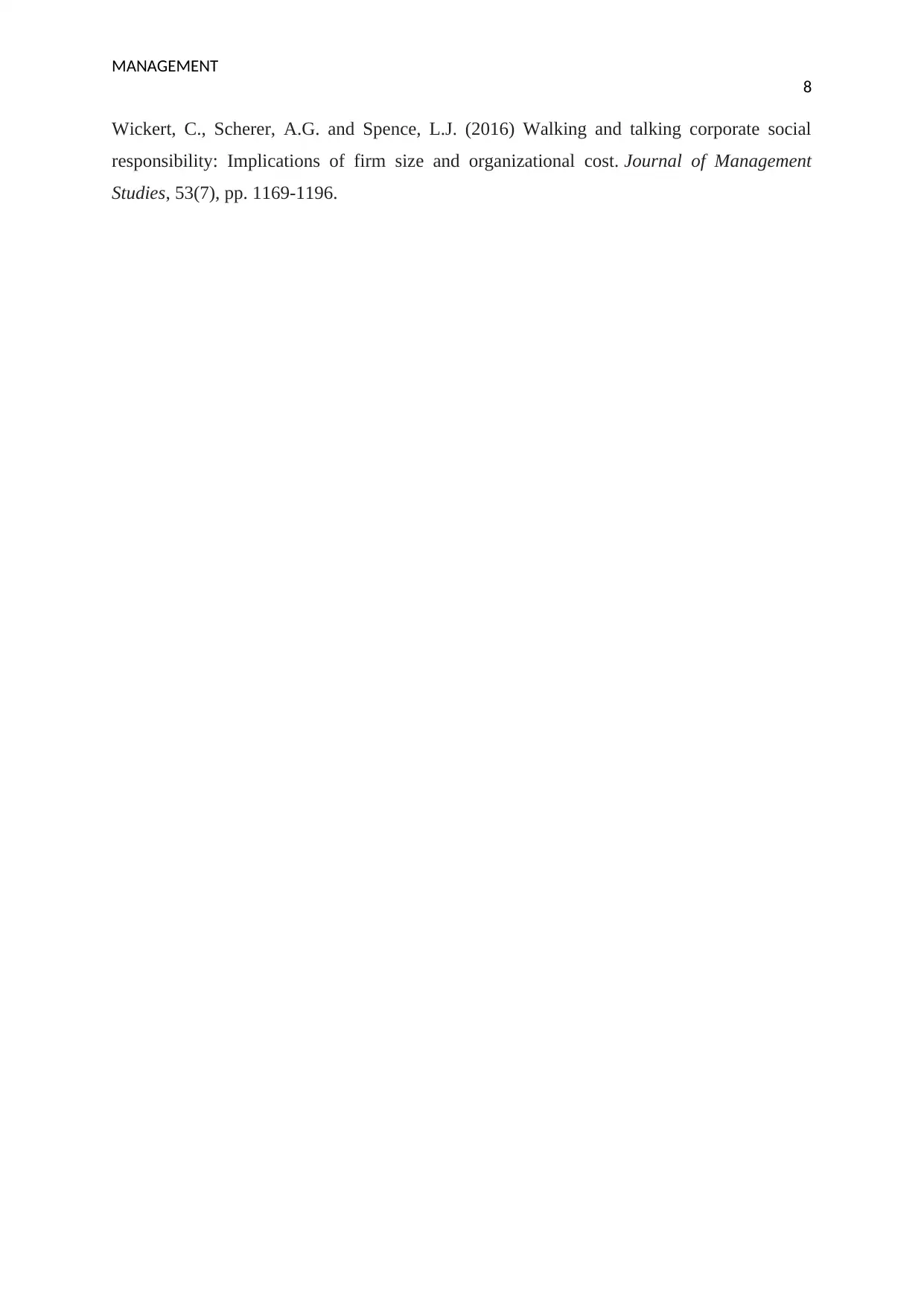
MANAGEMENT
8
Wickert, C., Scherer, A.G. and Spence, L.J. (2016) Walking and talking corporate social
responsibility: Implications of firm size and organizational cost. Journal of Management
Studies, 53(7), pp. 1169-1196.
8
Wickert, C., Scherer, A.G. and Spence, L.J. (2016) Walking and talking corporate social
responsibility: Implications of firm size and organizational cost. Journal of Management
Studies, 53(7), pp. 1169-1196.
⊘ This is a preview!⊘
Do you want full access?
Subscribe today to unlock all pages.

Trusted by 1+ million students worldwide
1 out of 9
Related Documents
Your All-in-One AI-Powered Toolkit for Academic Success.
+13062052269
info@desklib.com
Available 24*7 on WhatsApp / Email
![[object Object]](/_next/static/media/star-bottom.7253800d.svg)
Unlock your academic potential
Copyright © 2020–2026 A2Z Services. All Rights Reserved. Developed and managed by ZUCOL.





